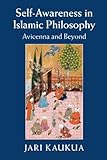Self awareness in Islamic philosophy: avicenna and beyond
Material type: TextPublication details: New Delhi Cambridge University Press 2015Description: x, 257 pISBN:
TextPublication details: New Delhi Cambridge University Press 2015Description: x, 257 pISBN: - 9781107460805
- 126.088297 K2S3
| Item type | Current library | Item location | Collection | Shelving location | Call number | Status | Date due | Barcode | |
|---|---|---|---|---|---|---|---|---|---|
| Books | Vikram Sarabhai Library | Rack 4-B / Slot 129 (0 Floor, West Wing) | Non-fiction | General Stacks | 126.088297 K2S3 (Browse shelf(Opens below)) | Available | 198621 |
Table of contents
Introduction
1. Preliminary observations: self-cognition and Avicennian psychology
2. Avicenna and the phenomenon of self-awareness: the experiential basis of the flying man
3. Self-awareness as existence: Avicenna on the individuality of an incorporeal substance
4. In the first person: Avicenna's concept of self-awareness reconstructed
5. Self-awareness without substance: from Abu al-Barakat al-Baghdadi to Suhrawardi
6. Self-awareness, presence, appearance: the ishraqi context
7. Mulla Sadra on self-awareness
8. The self reconsidered: Sadrian revisions to the Avicennian concept
Conclusion: who is the I?
Appendix: Arabic terminology related to self-awareness
Bibliography
Index.
This important book investigates the emergence and development of a distinct concept of self-awareness in post-classical, pre-modern Islamic philosophy. Jari Kaukua presents the first extended analysis of Avicenna's arguments on self-awareness - including the flying man, the argument from the unity of experience, the argument against reflection models of self-awareness and the argument from personal identity - arguing that all these arguments hinge on a clearly definable concept of self-awareness as pure first-personality. He substantiates his interpretation with an analysis of Suhrawardī's use of Avicenna's concept and Mullā Sadrā's revision of the underlying concept of selfhood. The study explores evidence for a sustained, pre-modern and non-Western discussion of selfhood and self-awareness, challenging the idea that these concepts are distinctly modern, European concerns. The book will be of interest to a range of readers in history of philosophy, history of ideas, Islamic studies and philosophy of mind.
https://www.cambridge.org/core/books/selfawareness-in-islamic-philosophy/CA8C4D24647D871DC54301BCB1DD4053#fndtn-information
There are no comments on this title.

